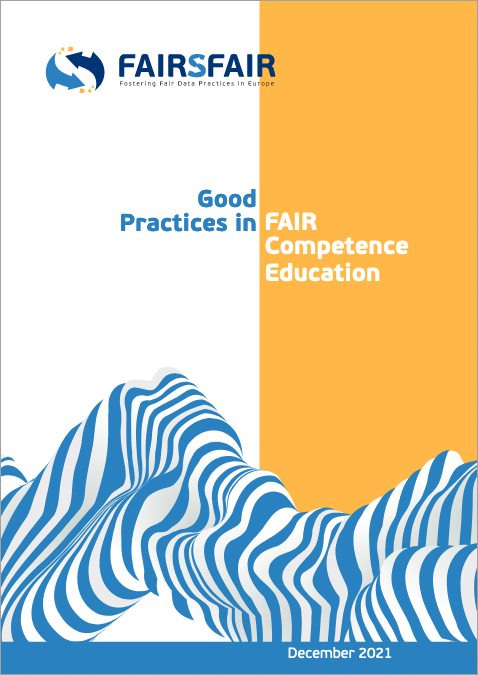FAIR Adoption Handbook & Report on Good Practices in FAIR Competence Education
The FAIRsFAIR adoption handbook “How to be FAIR with your data: a teaching and training handbook for higher education institutions” and the report “Good Practices in FAIR Competence Education” are practical tools to develop new teaching and training activities that can support the uptake of research data management (RDM) and FAIR data skills at different educational levels.
The Adoption Handbook
Directly responding to the needs of universities for practical tools to support the integration of RMD and FAIR data-related materials, skills and competences in their programmes at all levels, it provides ready-to-use model lesson plans on different topics: FAIR data, Data Management Plans (DMPs), repositories, data creation & reuse.
In addition, it offers FAIR competence profiles and learning outcomes for the bachelor, master and doctoral levels as well as information on course design and the implementation of the FAIR principles on the institutional level.
Download the Handbook
Scope and objectives
- Published on Zenodo as “How to be FAIR with your data: a teaching and training handbook for higher education institutions”
- Provide guidance and practical support to universities with integrating the FAIR principles and related content into curricula and teaching at all institutional levels.
- Community-driven deliverable developed by 40 European and international experts
The four main chapters cover key aspects in the implementation of FAIR data practices, not only to provide universities with ready-to-be-used material but also with a methodology on how to integrate FAIR teaching and training in their programmes.
 |
 |
 |
 |
| Chapter 3 - FAIR Skills and Competences | Chapter 4 - Teaching and training designs for FAIR | Chapter 5 - FAIR lesson plans | Chapter 6 - Implementing FAIR |
Illustration by Patrick Hochstenbach, CC BY-SA 4.0
- Chapter 3 - FAIR Skills and Competences --> Before actually implementing topics related to FAIR in curricula and teaching, the first need is to define which knowledge and competencies students at different educational levels should acquire. Here, we are suggesting a core set of Knowledge Units and associated learning outcomes for each of the bachelor, master and PhD levels. The sets are discipline-agnostic, so they require to be adapted slightly depending on the discipline in question. Using them allows having a basis for the development of a curriculum focused on the FAIR principles or identifying which topics are already covered and which are not in already existing curricula.
- Chapter 4 - Teaching and training designs for FAIR --> In higher education and research, the topic of FAIR has now considerable and is increasing interest. So far, courses on data handling (i.e. data analysis and/or scientific programming) rarely cover core FAIR topics like metadata standards, persistent identifiers and provenance. This chapter introduces a structured approach to course design as help for teachers and trainers in designing courses on the topic of FAIR. Explaining benefits, encouraging active learning using hands-on activities and helping students to use open resources in the context of FAIR principles.
- Chapter 5 - FAIR lesson plans --> Examples of lesson plans, for a number of topics related to RDM and the FAIR principles, are included in this chapter, where 16 points are not building an exhaustive list, but ready to be updated.
- Chapter 6 - Implementing FAIR --> Researchers can not do the heavy lifting in data management according to FAIR principles alone, they need to rely on support services provided by their institutions. This chapter therefore shifts the perspective from the individual researcher or research projects to the institution. This chapter focuses on the requirements and measures to be taken within an institution.
Report “Good Practices in FAIR Competence Education”
 This Report is a second practical tool that complements the work of the FAIR adoption handbook by providing concrete examples of how High Education Institutes and other organisations in HE have developed FAIR teaching and training at different level.
This Report is a second practical tool that complements the work of the FAIR adoption handbook by providing concrete examples of how High Education Institutes and other organisations in HE have developed FAIR teaching and training at different level.
It collects 7 case studies - from 5 European countries and one international example from South Africa - highlighting institutional practices focused on teaching and training RDM & FAIR data skills.
The conclusion of the report encourages universities to:
- Foster the engagement of research and support staff and build capacity across all institutional levels
- Develop and connect policies, infrastructures and skills training to mutually reinforce each other
- Be aware of opportunities at the European and national levels and integrate them into institutional strategies
Download the Report
You can also download the single Use Case factsheets below:
| Use Case #1 | Use Case #2 | Use Case #3 | Use Case #4 | Use Case #5 | Use Case #6 | Use Case #7 |
|---|---|---|---|---|---|---|
|
Data Train - Training in Research Data Management and Data Science: Good Practice |
Center for Research Data Management and Data Stewardship Course: Good Practice |
Research Data Management at Tampere University: Good Practice |
Research Data Management at University of Cape Town: Good Practice |
